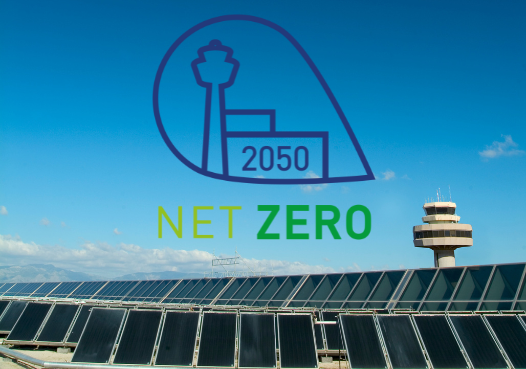European airports stride forward in progress towards net zero carbon emissions

- ACI EUROPE’s net zero 2050 resolution both expanded and reaffirmed today
- Almost half of Europe’s 2050 airports now accelerated to 2030 commitment
- Repository of airport net zero carbon roadmaps celebrates new additions
- ACI EUROPE Guidance for Airports’ Contribution to Net Zero Aviation published today
- Cooperation with Airbus unveiled
Brussels and Rome: Europe’s airport industry today announced significant progress in the concrete steps towards net zero CO2 emissions. Speaking at ACI EUROPE’s 32nd Annual Congress and General Assembly in Rome, Director General Olivier Jankovec announced a raft of accelerated and expanded commitments by its membership, both unilaterally and in increased collaboration with partners and stakeholders.
ACI EUROPE’s net zero 2050 resolution both expanded and reaffirmed today
First launched in 2019 and firmly establishing its leading role in decarbonisation action, the ACI EUROPE Resolution on Net Zero Carbon Emissions by 2050 is updated and reaffirmed. The Resolution formally commits the European airport industry to become net zero for carbon emissions under its control by 2050 at the latest, responding to the Climate Emergency and aligning the industry with the Paris Agreement.
Said Jankovec “Since the Resolution was first made in June 2019, both committing the airport industry as a whole and over 200 airports individually, the number of our members signing up as individual businesses has increased by more than 60, now numbering over 270. Let’s not forget this is a time period during which we were in the grip of a global pandemic. This speaks for itself. Moreover, the Resolution is endorsed by our National Association Members1, confirming the breadth and depth of these commitments across Europe”.
Close to 130 airports now have even more ambitious net zero targets in their sights
ACI EUROPE also announced today that, alongside the ever-gathering momentum behind the Net Zero 2050 Resolution, many of its members have gone further and announced specific plans taking them to net zero target dates before the 2050 milestone.
Nearly 50% of the airports committed to net zero CO2 emissions – 128 European airports run by 23 operators – now have a target date for 2030 or earlier. Collectively, these airports account for 23.8% of European air traffic.
Ten Swedish airports including Stockholm Arlanda already reached net zero CO2 emissions last year (28 March 2021). These will shortly be joined by Toulon Hyères in 2024, by Athens International Airport and the 20 Finavia airports in 2025, and in 2026 by Lyon.
Airports in the ACI EUROPE network committed to the 2030 target are: Aeroporti di Roma (Rome Fiumicino and Rome Ciampino), Aéroports de la Côte d’Azur (3 airports including Nice), ANA Portuguese airports (10 airports including Lisbon), AVINOR (44 airports in Norway including Oslo), 10 regional French airports operated by VINCI Airports (including Clermont Ferrand, Grenoble and Nantes), Basel Mulhouse, Belfast, Belgrade, Bologna, Bristol, Copenhagen and Roskilde, Enontekiö, Keflavik, Leeds Bradford, London City, Lithuanian Airports (3 airports including Vilnius), Luxembourg, Memmingen, Marseille Provence, Royal Schiphol Group (4 airports including Amsterdam Airport Schiphol), SAVE S.p.A. (Venezia Airport), SEA Milano airports (Milano-Malpensa and Milano Linate) and Tallinn Airport.
European Repository of Roadmaps swells in number
As the number of airports individually committing to net zero targets increases, so does the number making their detailed plans public. Less than 9 months since ACI EUROPE launched its Public Repository of Airport Net Zero Roadmaps, laying bare for public scrutiny the specific plans taking airports to their net zero targets, the number of airports included in the repository has jumped from 119 to 146.
Published today: Guidance on Airports’ Contribution to Net Zero Aviation and supporting the implementation of Destination 2050
ACI EUROPE has also today published further Guidance on Airports’ Contribution to Net Zero Aviation - Reducing Scope 3 emissions and supporting the implementation of Destination 2050. The Guidance aims to provide airports with practical solutions to reduce Scope 3 emissions - in particular aircraft emissions - supporting the implementation of Destination 2050 and thus contributing to the achievement of net zero CO2 emissions by European aviation by 2050.
Globally, airport operators’ Scope 1 and 2 emissions are estimated to account for 2% of aviation CO2 emissions. Aircraft emissions are not typically within the control or ownership of an airport operator, but are part of its wider eco-system and as well as a consequence of its activities - defined as Scope 3 under the Greenhouse Gas Protocol.
Jankovec commented: “This is a significant step-change. To date, our emphasis has been very much upon those activities within the control of an airport – which whilst a hugely important part of the aviation eco-system, is not the major contributor to global emissions from aviation. With this Scope 3 Guidance, we are harnessing the position of an airport as the place where all the services and actions come together and acting as a true catalyst for change”.
European airports make great strides within Airport Carbon Accreditation
Alongside the net zero commitments and the Public Repository, as the only global programme for reducing airport emissions and the progress made by airports under Airport Carbon Accreditation - the global standard and programme for carbon management at airports - is perhaps the fullest picture of all of airports’ commitment to decarbonisation.
Today ACI EUROPE announces that eight airports have met all the stringent requirements to become accredited at the highest level of the programme, Level 4+ Transition. From small regional airports in remote Lapland to the busiest airports in the UK and the Netherlands, the eight newcomers to this highest level have fully aligned their carbon management with the Paris Agreement and established effective partnerships with companies operating within their grounds to reduce emissions. The ground is now ready at London Heathrow, Amsterdam Schiphol, Eindhoven, Helsinki and 4 Lapland Airports (Rovaniemi, Kittilä, Kuusamo and Ivalo) to further accelerate decarbonisation of their own operations and their partners in line with their commitment to net zero aviation.
The momentum for climate action among European airports is also visible in the surge in new accreditations and upgrades to higher levels. In the past month, five European airports became accredited for the first time. These climate smart airports are: Ibiza in Spain, Carcassonne , Perpignan Rivesaltes, Béziers Cap d'Agde and Pau Pyrenees in France. The latest upgrades were made by Bulgaria’s Sofia (Level 3), Turkey’s Istanbul (Level 3), Spain’s Palma de Mallorca, Alicante Elche and Menorca (Level 2 and 3) and France’s Poitiers Biard and Bordeaux Mérignac (both at Level 2).
Groundbreaking Memorandum of Cooperation with Airbus signals commitment to bringing alternative energy sources to market
Finally, today marked the unveiling of a Memorandum of Cooperation between ACI EUROPE and Airbus, facilitating the exchange of knowledge and best practice and raising airports’ external credentials as regards hydrogen and electrification. The joint goal of the MoC is to accelerate the development of hydrogen-powered and hybrid-electric aircraft, prepare associated supporting airport infrastructure and bring these into the market.
In the signing of this agreement, ACI EUROPE and Airbus acknowledge that increased focus on reducing fuel consumption and environmental impacts is a key driver for decarbonising air transport. The collaboration will promote the set-up of technical standards and guidance facilitating the uptake of hydrogen and electric-powered aircraft. This MoC also aims to make proposals for the emergence of a satisfactory policy and regulatory framework to meet environmental and industrial needs so that zero emission flight becomes a reality in the foreseeable future.

